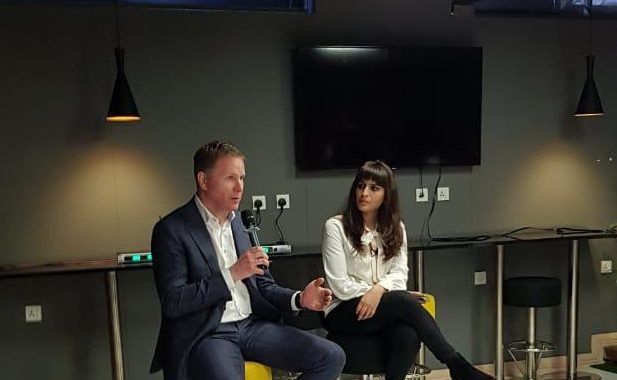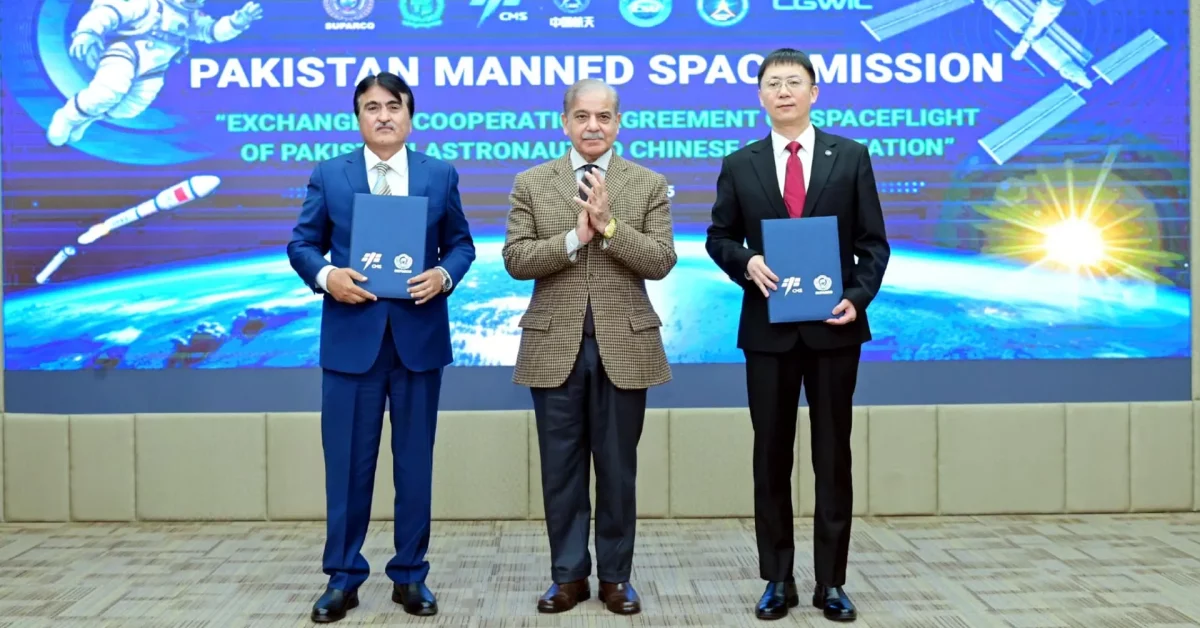
Digital Reporting Workshop | Event
April 4, 2019
Is Connectivity the Key to Success? | Conversations@Jazz
April 11, 2019The Secret Sauce for Success I Conversations@Jazz
In this interview, we join Aisha Sarwari, Head of Corporate Communications and Sustainability at Jazz, and Kjell Morten Johnsen, VEON’s Chief Operating Officer, as they delve into a conversation on his favorite things about Pakistan and the importance of good leadership for success.
Johnsen is a veteran in the telecom industry and has held key leadership positions in multiple telecom companies around the world, including the CEO of Beeline, Head of Telenor Europe, and CEO of Telenor Serbia, amongst others. The conversation is an insight on Kjell’s early life, his work ethic, the long career in the telecom sector, and his views on corporate leadership around the world, particularly in Pakistan. He also highlights the challenges the communicative industry faces and presents solutions for a future that will look nothing like the present. Check out the full interview below!
Kjell: So, we have maybe half an hour or so for this first question. But you are right I grew up in Norway, actually a smaller place. Norwegians are quite individualistic, people like me, we moved from home early. I moved out of my home when I was 17 and a half to continue studying, so I started living on my own quite early. That probably made me more individualistic in many ways but I’ve always enjoyed exploring new things, new places and I have lived in multiple countries; Russia, Ukraine, Serbia, France, Netherlands and Norway. I have worked in these countries not just being a tourist, so get a lot of impressions, you meet a lot of people which I think is cool. One of the privileges I have on this job is to be able to go around and meet with our management teams and our people in different countries, which I find very interesting. Even if it means you have red eye flights which is the part of the job. But in terms of my leadership approach I believe in empowerment and I believe that when you have Opcos like these, Jazz is a big company in Pakistan not only in telecoms. Lots of smart people, attractive employers, so it goes without saying that in a country with more than 200 million people you have one of the biggest companies. You have a lot of smart people and then it’s about believing in our own work force, the big change that we have done with our digital approach is now to believe in our Opcos, to move more of the initiative to the Opcos and I am sure that’s going to bring us results because it’s going to be more creativity, more involvement, more engagement. This is the approach that I follow with all the business that I do but I think it applies also to this part of our business.
Aisha Sarwari: You linked strong individualism to ambition and learning and wanting to move that to empowerment of a place and market like Pakistan. The work culture that we have here is that we don’t foster individualism at all until much later. The idea is co-existence, close networks, all of these cultural aspects impact business as well. So, in that transformation from an individual, ambitious empowering culture to a place which is frankly not a very mature market, we just got into this emerging market status. What are some of the challenges that you foresee and how was your leadership style going to help?
Kjell: I think those things hard to get because I consider myself individualistic doesn’t mean that everyone who works for me needs to be individualistic but I believe that when you decentralize and you empower then people can lead from the circumstances that they are operating in, so it’s up to me or the extended team that runs Jazz to find the right mix for this market. Does not at all mean that I would like them to drive a culture of extreme individualism, far from it, the right mix is the one that fits the market you are operating. But if you are centralized in your approach and you think that business should be run the same way in all countries then you would apply the same level of individualism in Netherlands, Pakistan, Russia and Nigeria. It’s not going to work, each county has its own secret sauce and finding that is the key to good leadership and for me as a leader I like to see people who work for me also have success and I am very happy when they get recognition for their success. It’s about finding the right people who fit for a job for a market they operate in and then give guidance to their next leader to make sure that it comes together.
Aisha Sarwari: What do you think is our secret sauce, for a market like Pakistan. By the way you are intimately familiar with this when you were in Telenor this was one of the places you were familiar with in terms of the market evolution and stuff. So, what would be our secret sauce?
Kjell: Well I was familiar with it but I was in Europe, so I was kind of involved but not completely involved. But in terms of the secret sauce of Pakistan, now I am not a big expert on Pakistan but it is about having a multinational team at the top so you get different kind of impulses and we have that. I don’t think it would have been good to have a complete Pakistani team, I don’t think it would have been good to have a complete expert team. I think this kind of mix is good, it shows people that its possible to grow into the top roles. And if people see that, it would be an added motivation for working and participating in the system. At the same time, you don’t make it some sort of a bubble or as homogeneous group of people who think the same way, you do bring in people who challenge in a positive way and I think that is very helpful in terms of driving the performance and the understanding.
Aisha Sarwari: Absolutely. Market like ours require constant challenges because complacency usually sets in. So, what are some of the things that you would really encourage to the top leadership and everybody not just at Jazz but generally to the one who wants to succeed, to employ in a market and environment like ours, where there is so much potential in youth but the trajectory is upwards. We need to do a few things, as you said, to challenge that inertia. What are the top 3 things that you would advise?
Kjell: First of all, I think we have a good development and I think we should be happy about it and we can celebrate that from time to time and that’s fair and its good. When it comes to people feeling that we have inertia, I don’t sense it now. We see multiple areas where we need to do things in order to be better prepared for the future. It’s the role of the management to bring up those big issues that are going to take us through the next level. So, as long as we hear those, the management team that complains little bit about the challenge is a good thing. Because then you know no one’s is taking that for granted. I am a believer in rotation and I think that over time it should rotate. Hopefully inside our group in different roles and that should be at several levels. Then you get new inputs, people who can see things with fresh eyes and then of course in that way we run the group. We look at all the countries and we try to estimate what the potential of each of these companies is and then we try to find the optimum stretch. And now you have actually over delivered so we have to soften your approach, but that of course is a direct approach that goes on.
Aisha Sarwari: I hope we don’t get punished for over delivering. The markets have changed radically since you entered the communicative industry. Did you ever anticipate that 2019 would be like this and what are some of the things that shocked you in this 2019 year, since you entered and what do you think will shock us in 5 years from now?
Kjell: I started in this industry in 2000 and that was the time people spent a lot of money on buying 3G licenses in Europe and almost bankrupted some companies in the industry. I heard throughout the years that this industry is doomed because of this wrath, someone is going to take over the customer ownership, everything is going to IP, we are not going to get paid for this or that. But the reality is that we are and we will continue to be a provider of a service that is based on a scarce resource spectrum and it’s up to the industry to be able to drive a good performance on that basis. Now what I see is more and more challenging, not specifically in Pakistan, we as leaders have to spend more and more time on the government relation’s agenda because the governments in many countries tend to have physical issues that they want to fix in short term.
Aisha Sarwari: And telcos are sort of soft targets sometimes.
Kjell: Yeah in a way because we are very visible and we on the face of it generate big gush words, people don’t forget the level of investment we do and that often a lot of multinational groups that pay the withholding taxes and it’s a huge amount of money. We have no reason to complain, we are being treated in a bad way but there has to be a dialogue for finding an optimum coexistence.
Aisha Sarwari: The double taxation that we have invested is almost 4.39 billion dollars in the country. I think sometimes what happens is a lot of policy makers are not aware of the leap frogging effect of digital technology and so had they known, they would completely help with the ease of business.
Kjell: I think that’s going to be very visible when we get into 5G. Let’s face it many people speak about 5G and they don’t necessarily have all the business models ready yet. And we certainly haven’t, we have also a lot of work to do on that front. But those countries that are not able to free up spectrum and make it available for the companies in an efficient way, which is not only about extracting money. Look at Italy, where a player spent billions of dollars each for spectrum. Those countries that are not able to make the spectrum available will fall behind.
Aisha Sarwari: And we are behind because the digital space is so fast.
Kjell: We saw this of course on 4G being massively rolled out in China and we see the American model where people have predictability about the spectrum, so gives incentive to rollout. Europe came significantly behind chances are that can repeat itself, so the advice to any country Pakistan inclusive is to take a very business focus approach on how can we get this rollout at a decent price so that a very big part of the population, a very young population in Pakistan’s case will come up with the next Google. That’s very hard but even if it’s a tenth of google it’s still very great.
Aisha Sarwari: Definitely possible. English specking language because of the colonial base, access to the education content that spreads out, really high internet density, in terms of percentage its slow but if we look at the sheer numbers its high. And there are education hubs everywhere, so it’s a success story heading towards the right direction. We really hope this leads us well. If you were to give a case study or best practices of a region or any model that you have seen that you have been vowed with in your career. You are like I went here, didn’t expect it, they figured this practice out right and turboing.
Kjell: In terms of the authorities or the business?
Aisha Sarwari: Both. So, they dealt with the authorities and some best digitalization practices that you in a region maybe, that you would want to share.
Kjell: I think it should actually be as I mentioned the approach to the spectrum in those 2 big countries. I think that is the best way to do it, they have done very well. I think we have seen the Scandinavian model quite focused on getting the services out rather than maximizing the revenues for the government. That government perspective, I think those models have worked better than most of these western European models in my personal opinion. In terms of companies I think those are daring challenges, even though they don’t most often get the most perfect return on their investment some of them have been taking very tough bets. Look at Geo in India, or what Megaphone did in Russia at some point which has become a very strong competitor to us. I don’t like to single out companies in our group but I also think the feeling that I get when I come to a place like Cresaptown that is now facing a merger between 2 players but still being very pushy on rethinking the model while nit being anywhere closer to be the biggest in the group. Its interesting to come to different places and see their approach. Your bet here now is the number one in connectivity and strengthening that position is also of course you can do financial services. That potentially is the real wow moments in the couple of years down the road.
Aisha Sarwari: Who or what is your 3 most favourite things in Pakistan. Because I know you have been here hardly 12 hours and I don’t know when your last trips were but whatever you know about this place, whether it’s in a textbook or some historical reference or food or fruit or people.
Kjell: Well you have elements of the central Asian kitchen, what we ate here today I like that. I don’t like that fancy 11 course white table cloth for 4 hours, where 4 of the courses are foam. This is the experimental cuisine outside of Barcelona. So, this is something that I like. If I should take from the business perceptive, the fact that you have a secular growth in the population. So, your growth in one or two years will be equal to my home country, that is quite astounding. So that for us is a business perspective. And then I would say how the team approaches the market, I see a team that definitely is not complacent but wants to drive the performance forward. We see we are covering more than, theoretically we can cover more than 200 million people but we don’t do that, but we are in a country with a 200 million+ with 12500 base stations and we put that into perspective with some other countries that’s not so much. We are getting a lot out of what we are putting in place.
Aisha Sarwari: Well that’s for sure. I think that’s a very Pakistani thing to do, using something for multiple uses.
Kjell: Maybe not such a bad thing.
Aisha Sarwari: It’s a wonderful thing. It really adds towards the sustainability and that’s an important concept. So those were 2, maybe there be one more.
Kjell: Those were 2, I thought they were 3.
Aisha Sarwari: Yeah those were two.
Kjell: Ok. Well what I don’t like I can tell you. I don’t like the flights that tend to land in Pakistan in the middle of the night or early in the morning.
Aisha Sarwari: Unfortunately, when people are designing business ideas or creating networks or thinking about flight or travel, it’s not really holistic. Everybody in their little silos and they don’t realise when it comes together its disjointed and business suffers.
Kjell: Last thing that I would bring one more is that the last time we had a town hall and I noticed that there were many pointed questions. So, people asked very thought out questions and 2 of them were and I was like ok. And that’s the way it should be, it should be a little challenging. I think that people have to learn as leaders is its ok not to have the perfect answer to every question. We are not robots, we do our best and then it becomes pretty good.
Aisha Sarwari: Wonderfull. Thank you Kjell for your time. Look forward to see you soon in Pakistan.
Kjell: Thank you.






